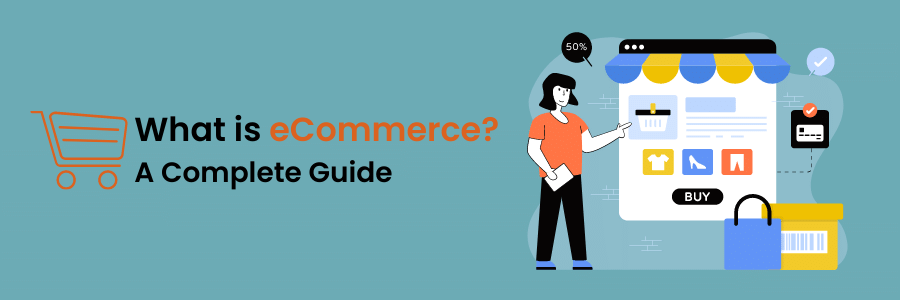What is eCommerce? A Complete Guide With Examples

What is eCommerce?
Electronic commerce, or eCommerce, refers to any transaction that takes place over the internet. From internet banking and electronic wallets to online ticketing and auctions, this comprises a wide range of online tools and activities. When people talk about eCommerce, though, they usually mean online shopping – the purchasing and selling of items over the internet.
This article useful if you want to create an eCommerce website to sell products online. We’ll go over everything you need to know about eCommerce stores, including how successful they are, the various eCommerce business models, the various sorts of items and services that can be sold online, and the advantages of eCommerce enterprises.
Is eCommerce Profitable?
The eCommerce sector is constantly expanding. Here are some interesting figures about the growth of eCommerce companies:
- Online sales will account for approximately 18% of all retail sales worldwide by 2020. They are predicted to continue to rise, reaching 21.8 percent in 2024.
- The pandemic resulted in an increase of $183 billion in online spending, which is expected to increase to $1 trillion by 2022.
- Experts forecast that by 2040, eCommerce will account for 95% of all purchases.
There are 4 main types of eCommerce business models.
eCommerce firms can be classified in a variety of ways. Based on the parties involved in the transaction, this article will divide eCommerce websites into four online market groups.
The four primary types of eCommerce, organised by business model, are as follows:
1. Business to Consumer (B2C)
Companies selling products and services directly to end-users are referred to as B2C.
They come in a variety of shapes and sizes, including:
- Retail – when a company sells goods or services to customers for personal use rather than reselling them to a third party. Consider purchasing an Apple phone, getting a pair of Adidas shoes, or employing Yard Guru to trim your lawn.
- Dropshipping – Merchants are not required to keep merchandise on hand. The seller buys something from a third-party vendor, who then ships it directly to the customer. to Many small enterprises have embraced this model due to its ease of management and minimal capital requirements. Megagoods and Sunrise Wholesale are two examples of dropshipping suppliers.
- Crowdfunding – This entails persuading others to invest in a new company or product in exchange for a reward. A little gift, monetary interest, or firm shares may be offered as a reward. GoFundMe and Kickstarter are two examples of crowdsourcing platforms.
2. Business to Business (B2B)
Both participants in the B2B paradigm are businesses. This transaction usually occurs when a company has to source materials for a product.
Take, for example, vehicle manufacturing. An vehicle retailer, in this situation, buys from manufacturers. Tires, rubber hoses, and glass wipers are examples of B2B transactions. These are materials used to make cars that will be sold to customers.
As a result, B2B eCommerce transactions are more likely to result in high-volume sales and repeat purchases.
3. Consumer to Business (C2B)
C2B businesses allow individuals to sell goods and services to companies. This method allows customers the ability to set their own prices.
Affiliate programmes and freelance websites, for example, are classified as C2B.
A marketing strategy in which a firm pays someone to promote its goods or services is known as an affiliate program. Because the affiliate is usually a well-known figure in the sector with a large following, businesses are prepared to pay for the promotion. Beauty bloggers, for example, can be affiliates for a company selling cosmetics.
A freelancer, on the other hand, sells their services to businesses. Freelancers can work in a variety of fields, including web development and financial services.
4. Consumer to Consumer (C2C)
The C2C business model links internet consumers by allowing one person to sell to another. The C2C model, like other models, can be used to sell both commodities and services. Many people use this strategy to sell used or homemade items.
This is most commonly done in online marketplaces that take a share of the profit. Etsy and Craigslist are two examples of B2C eCommerce platforms that allow customers to sell to other consumers after creating an account.
Customers can sell things via online auctions instead of making a direct purchase on some eCommerce platforms, such as eBay.
The Different Types of eCommerce Companies Based on the Products and Services Sold
The following are the types of business ideas and services eCommerce stores can offer:
- Physical products. These are tangible items, like clothes, beauty products, jewelry, food, cars, and computers.
- Digital products. This refers to non-tangible products, such as songs, eBooks, online courses, and computer software.
- Services. This is when people offer their skills to perform a specific type of work and get paid per project or hourly. Examples of people offering services online include graphic designers, web developers, and translators.
Examples of Successful eCommerce Sites
#Amazon
Amazon is an American technology business and online retailer that is one of the industry’s top participants. eCommerce, digital streaming, cloud computing, and artificial intelligence are among the areas it concentrates on.
Amazon.com has a slew of companies that sell a variety of goods and services. Amazon Fresh, a grocery delivery service based in the United States, and Amazon Web Services, a company that provides APIs and cloud computing platforms, are two examples.
#Walmart
Walmart, a fellow American retailer, sells almost any product or service imaginable. Gardening tools, office supplies, movies, and books are some of the popular items it sells. In addition to health and automobile care, this organisation offers a variety of other services.
One of the reasons for its success is that it adheres to the philosophy of providing affordable prices to its clients. Walmart accomplishes this through a variety of strategies, including cost-cutting, enhanced barcode technology, supply chain management, and direct partnership with diverse manufacturers.
#Alibaba
Alibaba is a Chinese online retailer and technology business that focuses on numerous eCommerce market segments, search engines, and cloud computing services. It is also known as the Alibaba Group.
It has a number of subsidiaries that help it drive its online activities in various specialty sectors. Alibaba.com, for example, is a B2B wholesale online marketplace, whereas AliExpress is primarily focused on B2C transactions. There’s also Taobao, a Chinese-only eCommerce platform designed to facilitate C2C eCommerce transactions.
#Wayfair
Unlike past eCommerce behemoths that sold practically everything, Wayfair focuses on a single product category: home furnishings. Make no mistake about the eCommerce website’s magnitude – it still has millions upon millions of things to pick from.
This American dropshipping company, formerly known as CSN Stores, works with over 10,000 suppliers throughout the world. AllModern, Joss & Main, Perigold, Birch Lane, and the main Wayfair website are the five retail websites where the firm offers its products. Each website sells furniture and home decor in a variety of styles.
Conclusion
To summarise, while the phrase eCommerce can refer to any form of electronic commerce transaction, as well as the tools and activities that go along with it, it mostly refers to online shopping. Global eCommerce, as an industry, is expected to continue to be a successful way to make money online. Amazon, Walmart, Alibaba, Wayfair, and eBay are examples of successful online stores.
We hope this article has helped you understand what eCommerce is and the different types of eCommerce business models.
If you want to start a new website or a business website, you must first build a good website, so buy a low-cost domain name and we will also provide the best website development.



